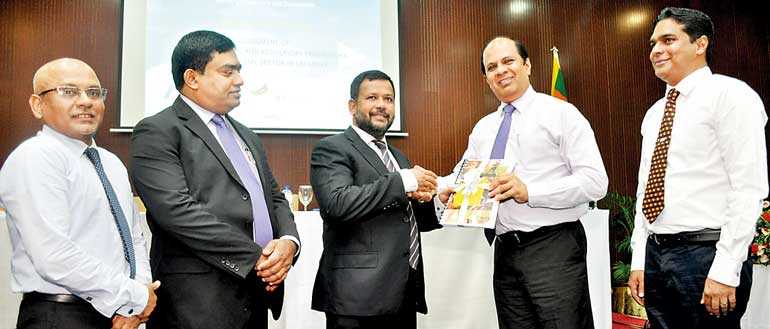Saturday Feb 14, 2026
Saturday Feb 14, 2026
Tuesday, 23 October 2018 00:00 - - {{hitsCtrl.values.hits}}

E&Y Senior Partner Arjuna Herath officially handing over the report to Industry and Commerce Minister Rishard Bathiudeen, while (from left) Industry and Commerce Additional Secretary M.A. Thajudeen, Industry and Commerce Secretary K.D.N. Ranjith Asoka and (from right) GIZ Sri Lanka Hasitha Wijesundara look on – Pic by Lasantha Kumara
By Ruwandi Gamage
Setting up an Advisory Commission, a centralised e-database and a one-stop shop for a business support service centre were some of the recommendations yielded by a study that assessed the institutional and regulatory framework of Small and Medium Enterprises (SMEs), which were presented yesterday at the final feedback session before the report was forwarded to the Cabinet.
The second draft of the report was officially handed over to the Minister of Industry and Commerce Rishad Bathiudeen at the final feedback session by the E&Y Senior Partner Arjuna Herath at the validation workshop held yesterday.
“There are more than one million registered SMEs in Sri Lanka providing employment to three million people. When we take the unregistered SMEs, the numbers will be much more. About 52% of our GDP is driven by this sector with more than 40% of employment. Also more than 70% of enterprises. All recent initiatives – including today’s assessment study – serve the reform vision of the Unity Government to link our SMEs to global markets,” Bathiudeen said, explaining the importance of SMEs.
The study, which was run for three months with over 200 interviews conducted, to set up a report to bring about institutional and regulatory reforms was commissioned by the Ministry of Industry and Commerce at a cost of Rs. 3.2 million and conducted by Ernst and Young (E&Y). The final feedback session opened discussions for entrepreneurs and policymakers to make changes in the draft report.
The study focuses on current business environment of SMEs in Sri Lanka, providing institutional framework supporting the sector and regulatory framework for the SMEs. The study has yielded 13 regulatory recommendations and 22 institutional recommendations in total.
It was proposed that an advisory commission for SMEs be set up to bring the three top institutions active in entrepreneurship, NEDA, IDB and SED-Small Enterprise Development, under one umbrella that would transform to Sri Lanka SME Authority, the apex SME body for national level coordination.
In the case of acquiring land, it was recommended that e-databases be created to handle old paperwork dating back a few years, so that processes could be faster and reliable. It was also recommended that more staff be allocated to help with speeding up such procedures.
By setting up a one-stop-shop business support centre, the report recognises that all SME licensing needs should be set up under one roof for a faster and more hassle-free process.
The study also recommends an SME Industrial Zone and an e-platform to manage SME market supplies. Another key suggestion made was to transfer the authority of SME regulations over to the Prime Minister’s office.
Questions were probed on the lack of consideration towards the opinions of private sector SMEs and more time was requested by private enterprise owners to present feedback, which received positive feedback from the policymakers and was promised consideration.